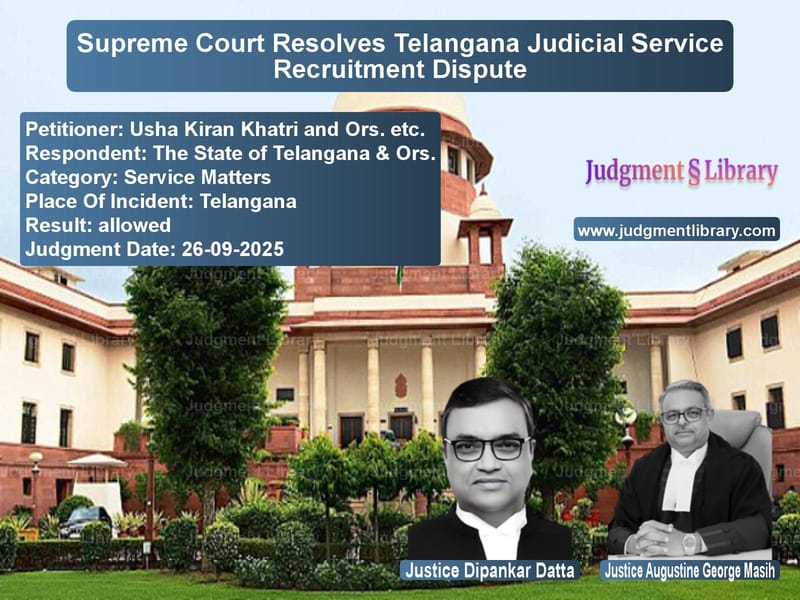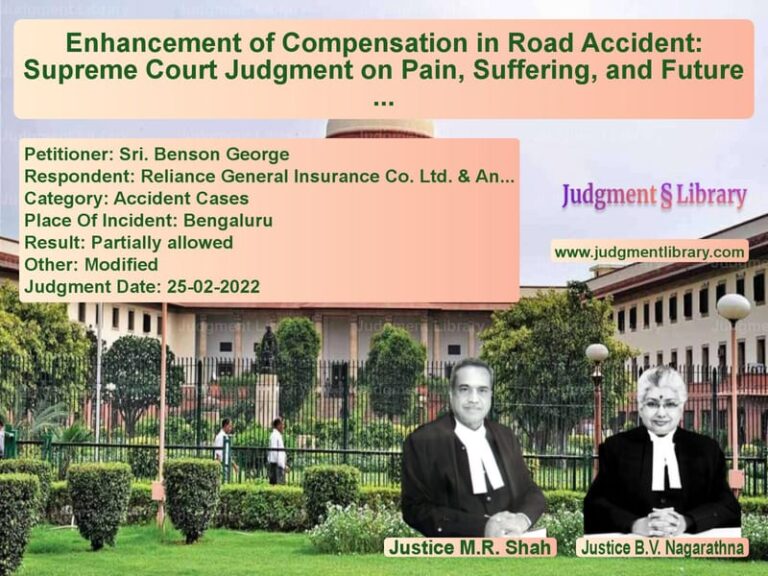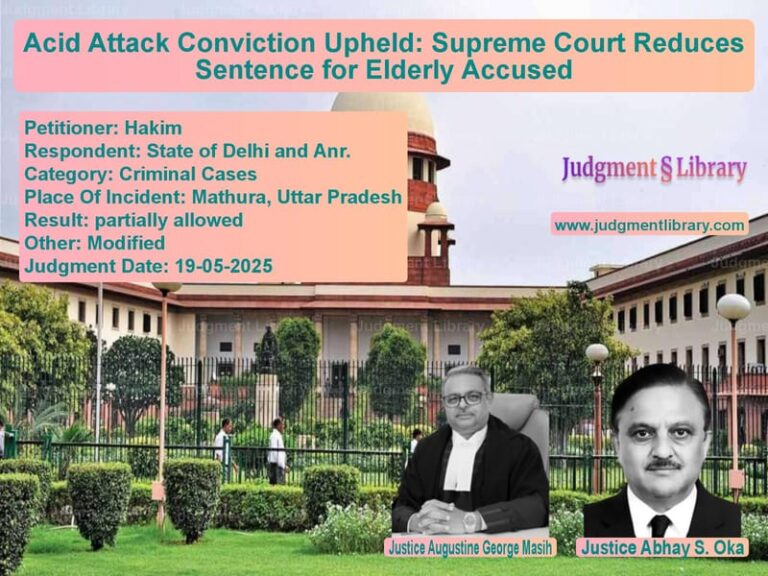Supreme Court Resolves Telangana Judicial Service Recruitment Dispute
In a significant development that brings relief to numerous aspiring judicial officers, the Supreme Court has resolved a contentious dispute surrounding the recruitment process for District Judges and Civil Judges in Telangana. The judgment, delivered on September 26, 2025, addresses the eligibility criteria controversy that had left many qualified candidates in limbo, unable to participate in the recruitment process despite possessing the necessary qualifications and experience.
The case involved multiple appeals and petitions challenging the common judgments of the Telangana High Court that had upheld the restrictive eligibility criteria in the Telangana State Judicial Service Rules, 2023. The controversy centered around Rule 5(5.1)(a) of the 2023 Rules, which stipulated that for appointment as District Judge by direct recruitment, a candidate must be “one who has been practicing as an Advocate in the High Court or Courts working under the control of the High Court for not less than 7 years as on the date of the notification.” The critical issue arose from Rule 2(k), which defined “High Court” as meaning “and includes High Court for the State of Telangana w.e.f. 02.06.2014.”
The appellants and petitioners, who included advocates practicing in various courts across Telangana, had applied for appointment to 11 posts of District Judge (Entry Level) by direct recruitment when the State issued Notification No. 180/2023-Rc on April 12, 2023. These candidates believed they possessed the requisite qualifications and submitted their applications accordingly. However, their hopes were dashed when the Registrar of the High Court issued a list on July 3, 2023, containing names of rejected applicants, including the appellants and petitioners. The common reason for rejection was that they were not eligible to participate in the recruitment process in terms of Rule 5(5.1)(a) of the 2023 Rules.
Aggrieved by this rejection, the candidates approached the Telangana High Court under Article 226 of the Constitution of India. The High Court, in its common judgment dated December 27, 2023, dismissed their petitions, holding that “the 2023 Rules are not in contravention of Article 233 of the Constitution” and that “‘High Court’ as mentioned in Rule 2(k) of the 2023 Rules does not include other High Courts and refers only to the High Court of Telangana.” The High Court further reasoned that since the appellants/petitioners were not practicing advocates in the High Court, they did not have the requisite seven years of experience and, therefore, could not contend that Rule 5(5.1)(a) of the 2023 Rules was discriminatory, arbitrary, and violative of Article 14 of the Constitution.
Interestingly, during the pendency of the writ petitions before the High Court, interim relief had been granted on July 12, 2023, permitting the appellants/petitioners to appear in the written examination scheduled for July 22-23, 2023. The candidates participated in the examination and claimed to have secured qualifying marks. They were even called for oral interviews through an Official Memorandum dated October 16, 2023, sent by the Registrar of the High Court. However, the final rejection of their candidature prompted the appeals to the Supreme Court.
The Supreme Court bench comprising Justice Dipankar Datta and Justice Augustine George Masih heard extensive arguments from learned senior counsel for the appellants, counsel for the petitioners in the special leave petitions, counsel for the writ petitioners, counsel for the intervenors, senior counsel for the High Court, and counsel for the State. Multiple decisions were cited by both sides during the proceedings.
In a pragmatic approach to resolving the dispute, the Supreme Court, while reserving judgment, requested the learned senior counsel representing the High Court to seek instructions on certain alternatives that were suggested, with the specific rider that “acceptance of the suggestion favourable to the appellants/petitioners/intervenors/writ petitioners would not be treated as a precedent.”
The High Court responded positively to this suggestion. As noted in the Supreme Court’s judgment, “the High Court has no objection to declare the results and to appoint such of the appellants/petitioners/intervenors who have qualified the 2023 recruitment examination for appointment as District Judges as an exceptional case without unsettling the 2023 Rules.”
The Supreme Court appreciated this stand taken by the High Court and accordingly directed that “the High Court to declare the results of the appellants/petitioners/intervenors and to proceed for verification of their credentials/antecedents. Such of the qualified appellants/petitioners/intervenors who are found suitable may be appointed by offering them letters of appointment, as a special case, as early as possible but not later than two months from date of service of a copy of this order on the High Court.”
The Court made it explicitly clear that this order was “strictly confined to the facts and circumstances of the appeals and petitions before us and may not be treated as a precedent for future cases.” The Court also clarified that since the appointments were being offered acceding to a suggestion of the Court, the successful candidates “upon their appointment as District Judge shall not be entitled to claim any arrears of monetary benefits and their seniority shall be determined based on their dates of appointment, meaning thereby that those who have already been appointed shall rank senior to them.”
A similar direction was issued for the writ petitioners who had participated in the examination for Civil Judge (Junior Division) pursuant to the Supreme Court’s interim order dated August 6, 2024. The Court kept all questions of law raised before it open, meaning that the legal issues surrounding the interpretation of the eligibility criteria were not conclusively decided and could be raised in future cases.
This judgment represents a balanced approach to resolving a contentious issue in judicial appointments. While the Supreme Court did not strike down the controversial eligibility criteria in the 2023 Rules, it facilitated a practical solution that allowed qualified candidates who had already participated in the recruitment process to be considered for appointment. The Court’s intervention ensured that the investment of time and effort by these candidates, who had cleared the written examination and viva-voce, would not go to waste.
The resolution also demonstrates the importance of judicial dialogue and the willingness of constitutional institutions to find middle ground in the interest of justice. The High Court’s cooperation in accepting the Supreme Court’s suggestion reflects institutional maturity and a shared commitment to ensuring that qualified candidates are not unfairly excluded from judicial service.
This case highlights the ongoing challenges in framing eligibility criteria for judicial appointments that are both fair and practical. While states have the authority to prescribe qualifications for judicial service, such criteria must not be unduly restrictive or exclusionary. The Supreme Court’s approach in this case – encouraging a practical solution while keeping larger legal questions open – strikes an appropriate balance between respecting the rule-making authority of the state and ensuring that deserving candidates are not unfairly disadvantaged.
The judgment serves as a reminder that recruitment processes must be designed to attract the best talent to the judiciary while maintaining fairness and transparency. As the successful candidates prepare to take up their positions as District Judges and Civil Judges, this resolution marks an important step toward strengthening the judicial system in Telangana by ensuring that qualified and competent lawyers can serve on the bench.
Petitioner Name: Usha Kiran Khatri and Ors. etc..Respondent Name: The State of Telangana & Ors..Judgment By: Justice Dipankar Datta, Justice Augustine George Masih.Place Of Incident: Telangana.Judgment Date: 26-09-2025.Result: allowed.
Don’t miss out on the full details! Download the complete judgment in PDF format below and gain valuable insights instantly!
Download Judgment: usha-kiran-khatri-an-vs-the-state-of-telanga-supreme-court-of-india-judgment-dated-26-09-2025.pdf
Directly Download Judgment: Directly download this Judgment
See all petitions in Employment Disputes
See all petitions in Recruitment Policies
See all petitions in Public Sector Employees
See all petitions in Judgment by Dipankar Datta
See all petitions in Judgment by Augustine George Masih
See all petitions in allowed
See all petitions in supreme court of India judgments September 2025
See all petitions in 2025 judgments
See all posts in Service Matters Category
See all allowed petitions in Service Matters Category
See all Dismissed petitions in Service Matters Category
See all partially allowed petitions in Service Matters Category







